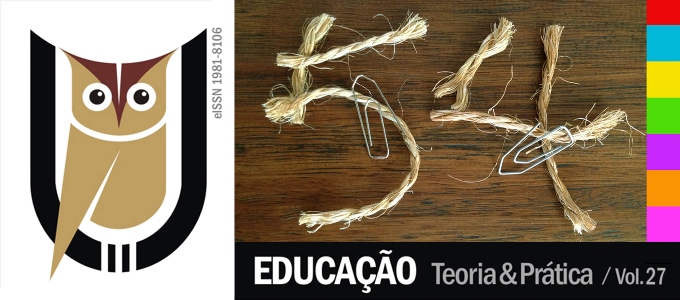DISCUTINDO ASPECTOS METODOLÓGICOS DE ENSINO E APRENDIZAGEM NO ATENDIMENTO EDUCACIONAL ESPECIALIZADO PARA ALUNOS COM SURDEZ
DOI:
https://doi.org/10.18675/1981-8106.vol27.n54.p56-73Palavras-chave:
Alunos com surdez. Ensino e aprendizagem. Atendimento educacional especializado.Resumo
Este artigo tem o propósito de evidenciar as práticas pedagógicas para o aluno com surdez no âmbito do Atendimento Educacional Especializado – AEE. Na prática docente, as principais dificuldades encontradas no processo de inclusão escolar de pessoas com surdez referem-se, por exemplo, ao desconhecimento da língua de sinais e a falta de estratégias metodológicas adequadas a um ensino que respeite a singularidade do indivíduo surdo. Diante desse cenário, o AEE surge com o intuito de criar e aprimorar as condições para o aprendizado e o ensino escolar para todos. Trata-se de um ensaio teórico fundamentado numa revisão crítica da literatura. As discussões sobre as práticas pedagógicas para alunos com surdez no âmbito do AEE serão apresentadas focalizando elementos que ampliem a visão sobre as reais condições do educando surdo, motivados pela crença no seu potencial de desenvolvimento e de aprendizagem. É necessário reforçar o funcionamento do AEE, mas se contrapondo a uma utilização movida por modismos e/ou pelo afã dos discursos de ser apenas uma prática inclusiva. Palavras-chave: Alunos com surdez. Ensino e aprendizagem. Atendimento educacional especializado.Publicado
Como Citar
Edição
Seção
Licença
Os Autores que publicam nessa revista concordam com os seguintes termos:
a) Os autores cedem os direitos autorais à revista, com o trabalho simultaneamente licenciado sob a Creative Commons Attribution License que permite o compartilhamento do trabalho com reconhecimento da sua autoria e publicação nesta revista.
b) A política adotada pela Comissão Editorial é a de ceder os direitos autorais somente após um período de 30 meses da data de publicação do artigo. Transcorrido esse tempo, os autores interessados em publicar o mesmo texto em outra obra devem encaminhar uma carta à Comissão Editorial solicitando a liberação de cessão dos direitos autorais e aguardar resposta.
c) Esta revista proporciona acesso público a todo o seu conteúdo, uma vez que isso permite uma maior visibilidade e alcance dos artigos e resenhas publicados. Para maiores informações sobre esta abordagem, visite Public Knowledge Project, projeto que desenvolveu este sistema para melhorar a qualidade acadêmica e pública da pesquisa, distribuindo o OJS assim como outros softwares de apoio ao sistema de publicação de acesso público a fontes acadêmicas. Os nomes e endereços de e-mail neste site serão usados exclusivamente para os propósitos da revista, não estando disponíveis para outros fins. This journal provides open any other party  Esta obra está licenciada sob uma Licença Creative Commons
Esta obra está licenciada sob uma Licença Creative Commons











